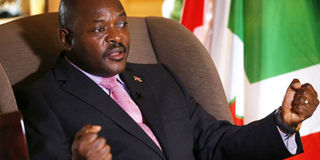Burundi arrests aid workers for flouting foreign NGO ban

The law compels foreign NGOs to place a third of their budget in Burundi's central bank and to implement new ethnic quotas favouring the majority Hutus, the tribe of President Pierre Nkurunziza. AFP PHOTO
What you need to know:
- Burundi has been in the throes of a political crisis since April 2015 when Nkurunziza successfully ran for a controversial third term.
- Violence since then has left at least 1,200 dead, forced more than 400,000 from their homes and triggered an investigation by the International Criminal Court.
Three aid workers have been arrested in Burundi for defying a government ban on foreign relief agencies announced this month, authorities said Thursday.
A Burundian and two Congolese, reportedly employed by the US-based International Rescue Committee (IRC), were arrested Wednesday in the west of the country for violating a ban imposed on October 1.
"Yesterday... acting on the information of the administration, police in Muyinga got surprised after finding three IRC agents at work, despite the ban on the work of NGOs," said Pierre Nkurikiye, spokesman for the Ministry of Public Security.
"All were working without special permission, they are being interrogated," he said.
The IRC declined comment on the arrests which were confirmed by local government and diplomatic sources.
Burundi's National Security Council decided in late September to suspend for three months the activities of all foreign aid agencies until they abide by a strict new law controlling their operations.
The law compels foreign NGOs to place a third of their budget in Burundi's central bank and to implement new ethnic quotas favouring the majority Hutus, the tribe of President Pierre Nkurunziza.
Only four out of an estimated 130 foreign NGOs have so far filed the required documents, according to the interior ministry.
Wednesday's arrests are seen as a warning to foreign NGOs which are believed to be reluctant to abide by the new rules and are preparing a united response.
The suspension is being felt in the poor central African nation where many rely on the life-saving activities of aid agencies.
Burundi has been in the throes of a political crisis since April 2015 when Nkurunziza successfully ran for a controversial third term.
Violence since then has left at least 1,200 dead, forced more than 400,000 from their homes and triggered an investigation by the International Criminal Court.



